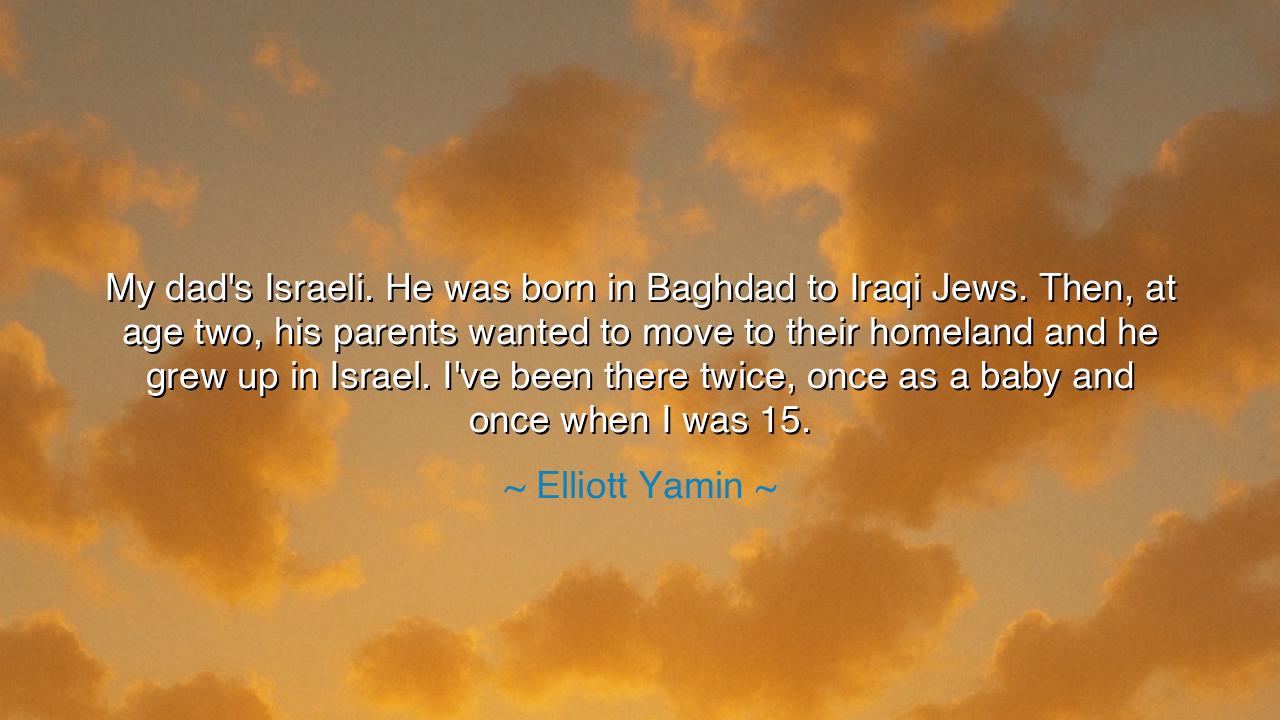
My dad's Israeli. He was born in Baghdad to Iraqi Jews. Then, at
My dad's Israeli. He was born in Baghdad to Iraqi Jews. Then, at age two, his parents wanted to move to their homeland and he grew up in Israel. I've been there twice, once as a baby and once when I was 15.






In the vast and winding river of human history, there are stories of families and individuals who are born in one place, yet find their paths intertwined with many lands and many identities. The words of Elliott Yamin capture the essence of such a journey: "My dad's Israeli. He was born in Baghdad to Iraqi Jews. Then, at age two, his parents wanted to move to their homeland and he grew up in Israel. I've been there twice, once as a baby and once when I was 15." These simple words speak of a complex heritage—of migration, identity, and the search for belonging that transcends borders and nationalities.
In the ancient world, there was no clearer example of such journeys than the Hebrews, whose story was one of exile, return, and the creation of a new identity in a homeland. The story of the Exodus from Egypt and the return to Canaan is a tale that echoes down through the centuries. The Israelites, wandering for forty years in the wilderness, sought not just a physical land, but a spiritual homeland, a place to call their own. The notion of homeland has always been tied not only to a geographic location but to an identity—the belief that one's roots, one's family, and one's legacy are tied to a place that holds both history and meaning.
Elliott Yamin's father, like many others throughout history, was part of a migration that carried him across vast distances, from the ancient city of Baghdad to the nascent state of Israel. The story of Iraqi Jews is one of both hardship and hope. Once thriving in the ancient land of Mesopotamia, the Jewish community in Iraq was among the oldest in the world. Yet, the winds of change and the tides of political unrest forced many to leave their homes in search of a new beginning. Like the ancient Israelites, these Jews sought not just a place to live, but a home where they could live in peace and continue their cultural and spiritual traditions.
In the case of Elliott Yamin’s father, his family's migration from Baghdad to Israel at such a young age was more than a relocation; it was the forging of a new identity in a land that had long been promised to his people. His parents sought a new life, one that was filled with the hope of rebuilding and reclaiming what was theirs by birthright. The experience of leaving behind a familiar world to begin anew in an unfamiliar land speaks to the power of migration, not merely as a physical journey, but as a spiritual one. The soul, too, moves with the body, searching for a place of belonging, of peace, and of hope.
Yet, in this migration, there is also a tension—a tension between the land of one's birth and the land of one's forebears. This dual identity is a theme echoed in the ancient world, from the story of Odysseus, who sought to return to his homeland of Ithaca, to the Romans, who sought their own new identity after the fall of their empire. Elliott Yamin's journey to Israel, first as a baby and later as a teenager, mirrors this duality. The act of visiting the homeland, not just as a destination, but as a place to reconnect with the past, speaks to the human need to understand where we come from in order to know who we are.
The lesson here, then, is one of rootedness and migration—the recognition that while we may journey far from our place of birth, we are forever shaped by the lands that come before us. We are the sum of our experiences, both in the places we leave behind and the places we choose to call home. It is through this process of self-discovery—understanding our roots, embracing our heritage, and forging a new identity—that we truly come to know ourselves. Just as the ancient Hebrews sought a homeland that would give them both a physical and spiritual connection to their past, so too must we seek the places that shape us, not only in the world but in the depths of our souls.
To apply this lesson in our own lives, we must first seek to honor our past, understanding that it forms the foundation of who we are today. Embrace the journey—whether it is a journey of migration, self-discovery, or simply understanding your roots—and let it inform the choices you make. And just as Elliott Yamin's father chose to move forward, to build a new life in Israel, let us also have the courage to shape our own futures, knowing that our past will always be a part of us, but it does not define us. In honoring our heritage, we create new possibilities for ourselves and for those who come after us.






AAdministratorAdministrator
Welcome, honored guests. Please leave a comment, we will respond soon